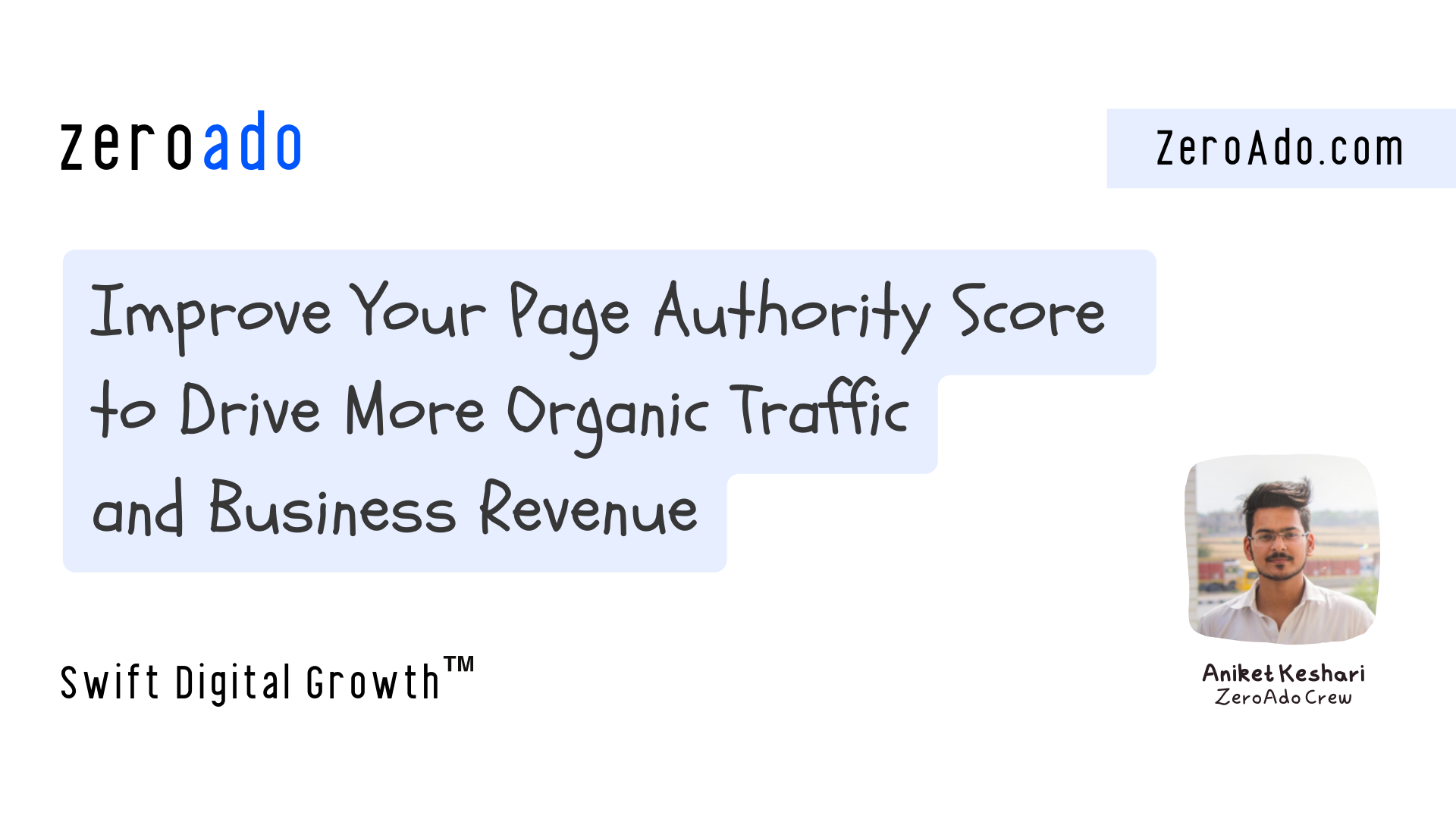Ever been judged by a report card? It’s a peculiar feeling, isn’t it? Just like how grades reflect a student’s performance in school, websites get scores too. Among which one of the major scores is Page Authority (PA).
PA is based on various factors such as content quality, on-page SEO, user experience, and link-building practices. It shows how strong your page is and highlights areas where you can improve, similar to how subjects in school are graded.
In this blog, I’ll explain everything you need to know about Page Authority and how it directly impacts and benefits your SEO. Let’s turn your website’s report card into an A+!
- What is Page Authority (PA)?
- Factors that help in calculating Page Authority score
- Page Authority vs Domain Authority
- Page Rank and Page Authority
- How to check Page Authority?
- How to improve Page Authority score?
- Invest in SEO if you want to increase your Page Authority
- Frequently Asked Questions – Page Authority
What is Page Authority (PA)?
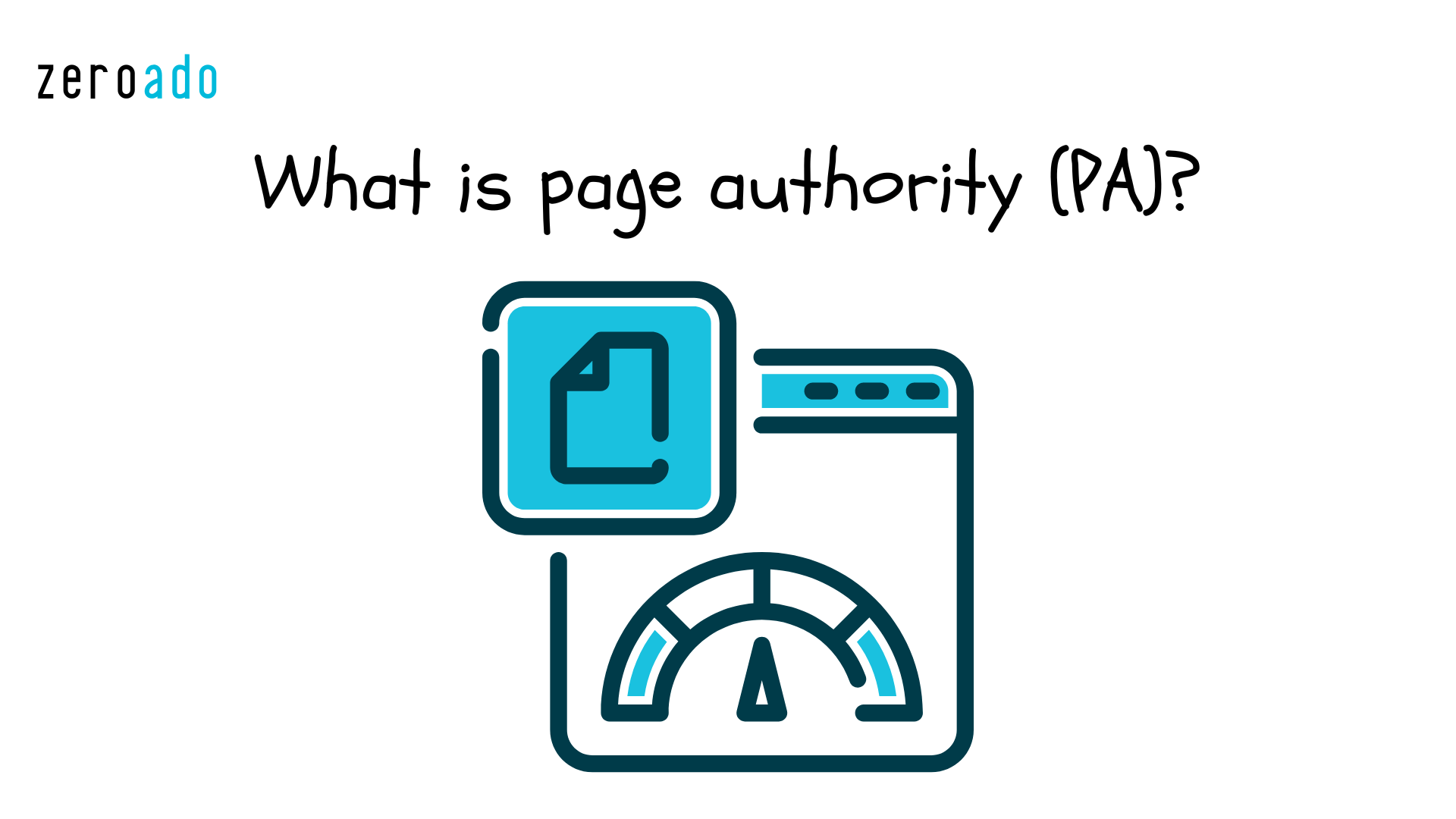
Page Authority (PA) is a search engine ranking score developed by Moz that predicts how well a specific page on your website will rank on search engine results pages (SERPs). The score ranges from 1 to 100, and higher scores mean a better ability to rank.
However, let me tell you one thing. PA is not an official ranking factor used by search engines like Google. It basically serves as a useful metric for SEO professionals to assess the strength of a page in relation to competitors and to track the effectiveness of their SEO and content marketing efforts over time.
Factors that help in calculating Page Authority score
Now, let’s look at some key factors Moz considers when calculating the Page Authority of your web pages.
Backlinks
Backlinks are like “votes of confidence” from other websites. The more high-quality, relevant websites that link back to your page, the better your PA becomes. You can think of it like getting recommendations from well-respected people in your industry and Google values that.
Content quality
Did you know? Content is king! The better your content is the more likely users will stay on your page and even share it. By better, it should be informative, engaging, optimized, and well-written. Because Google notices this and rewards you with a higher PA. So, always aim to create content that adds value to the user.
On-page SEO
On-page SEO is a type of SEO that helps you optimize things like meta tags, headers (H1, H2, H3), content, and keywords. This is basically done to make it easier for search engines to understand what your page is about and what you’re delivering to users. It’s like putting clear labels on all the sections of your page for Google to read.
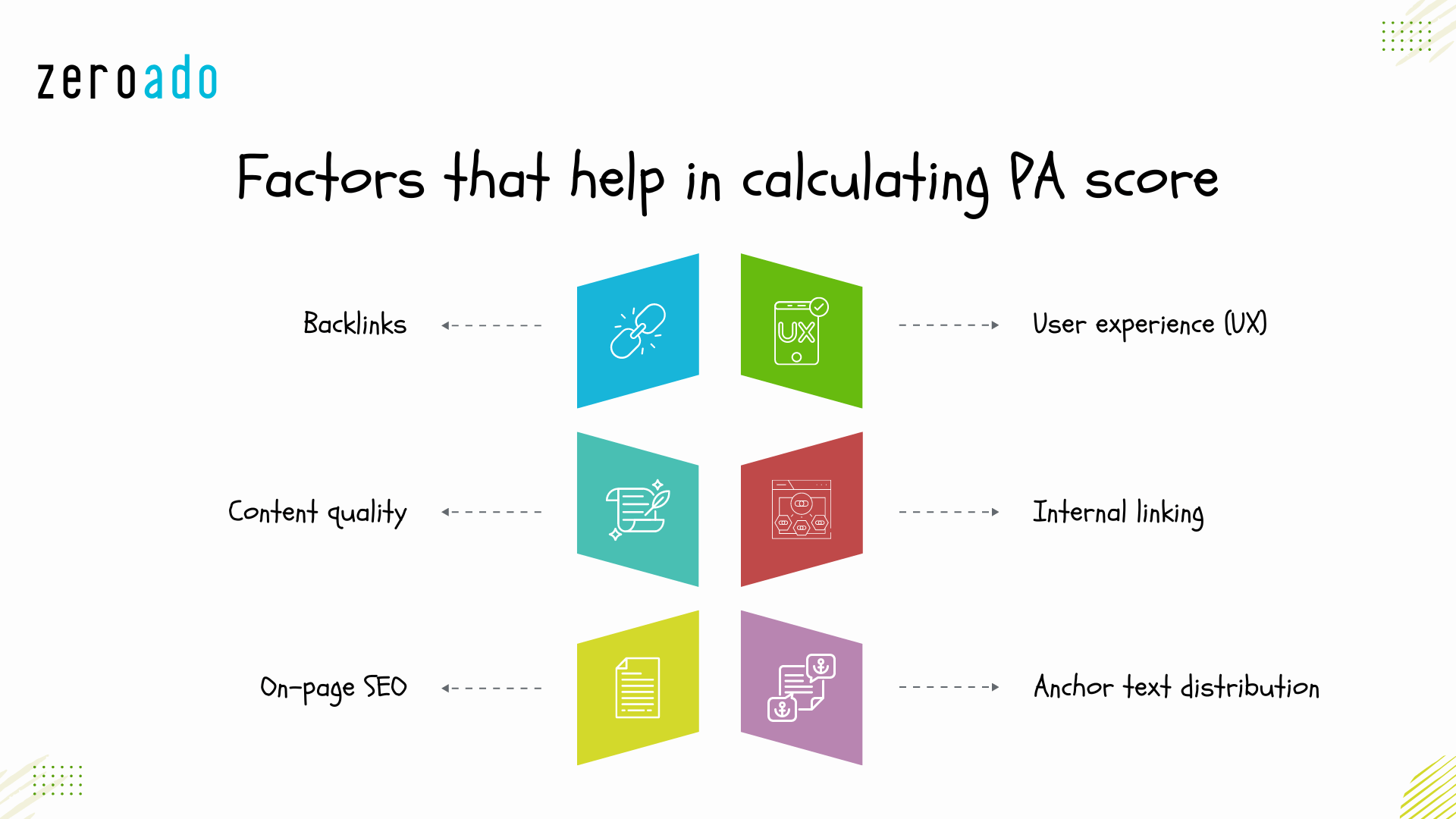
User experience (UX)
How many times have you left a site because it wouldn’t load? Probably dozens. A slow-loading or hard-to-navigate page can push your visitors away. Google wants to provide users with the best experience, so if your page loads quickly, works well on mobile, and is easy to navigate, your PA will benefit (increase).
Domain Authority (DA)
Similar to Page Authority (PA), there’s a term called Domain Authority (DA). However, PA refers to the ranking strength of a specific page, while DA refers to the entire domain. If your website’s domain is seen as trustworthy and has a high DA, individual pages on your site are likely to perform better in search results. It’s like your page benefits from your site’s overall reputation.
Internal linking
Internal linking is one of the best white-hat link-building techniques for distributing authority across your website. Think of them as bridges connecting your content. The more strategically you link pages within your site, the better Google understands your site’s structure, which can improve your PA.
Anchor text distribution
The words that are hyperlinked in backlinks are known as anchor text, and they matter. Using varied, relevant anchor texts helps Google understand the context of your page. It’s like labeling what your content is about, which boosts relevance and improves your ranking.
Page Authority vs Domain Authority
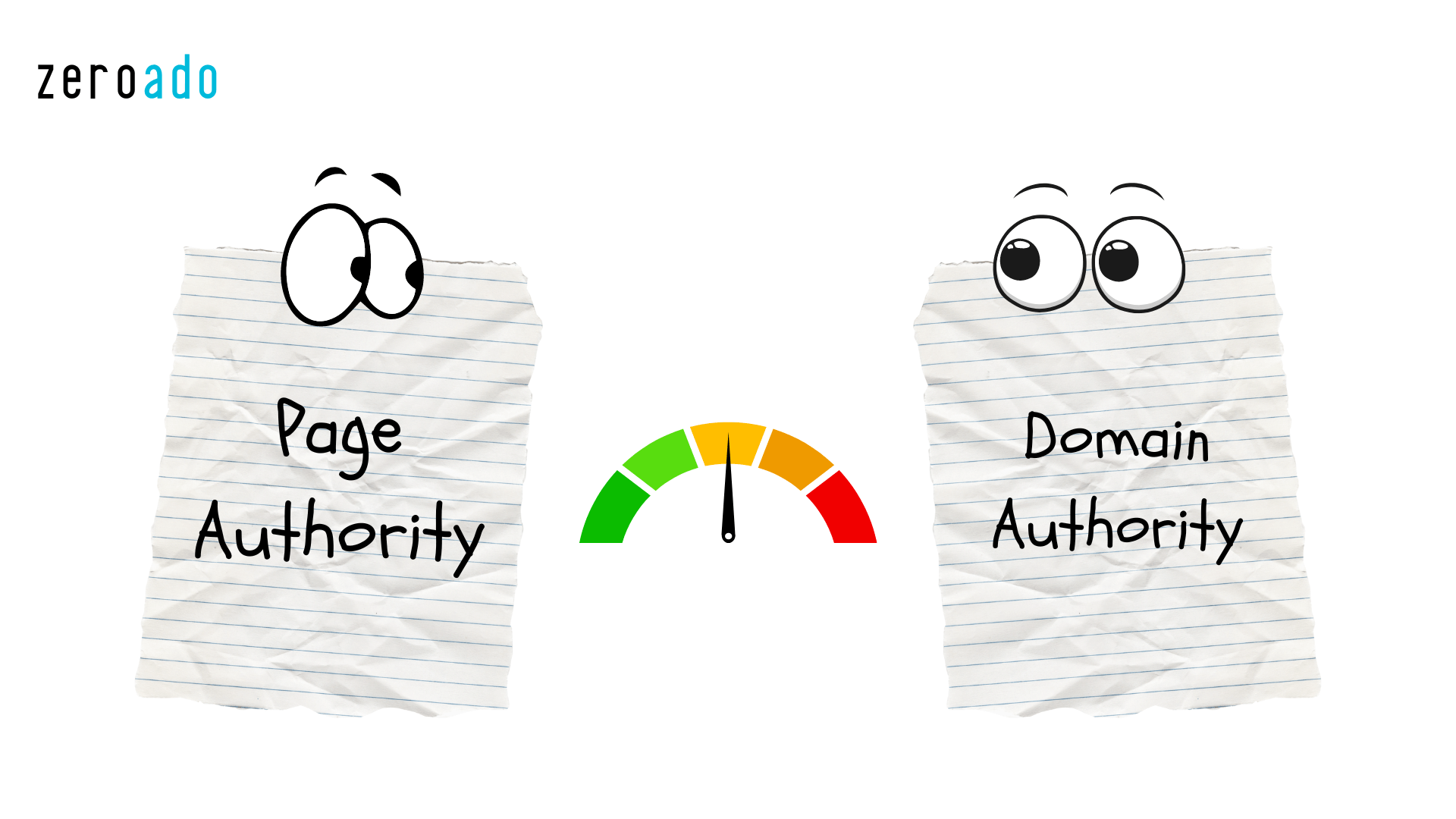
Page Authority (PA) and Domain Authority (DA) are both metrics developed by Moz to predict how well a webpage or a domain will rank in search engine results. But they measure different aspects of SEO performance. Page Authority refers to the likelihood of a specific page ranking well in search engine results, based on factors like backlinks, content quality, and on-page SEO.
On the other hand, Domain Authority measures the overall strength of the entire domain (i.e., the whole website) and its potential to rank well as a whole. While PA focuses on individual pages, DA reflects the cumulative authority and trustworthiness of the entire site.
Let me explain it with a simple example. Think of Wikipedia and a small local coffee blog. Wikipedia has a very high Domain Authority (DA) because it’s a huge, trusted site with tons of reputable backlinks. So, even if someone creates a brand-new page on Wikipedia, it’s likely to rank well because the entire site is trusted by search engines.
Now, take the coffee blog. It may not have a high DA because it’s smaller and newer. But, if the blog creates a really well-researched article on “best coffee shops in New York” and are building backlinks, that specific page can develop a strong Page Authority (PA).
In this case, even though the overall site has a lower authority, the page itself can outrank a similar Wikipedia page due to its high-quality content and strong backlinks.
Page Rank and Page Authority
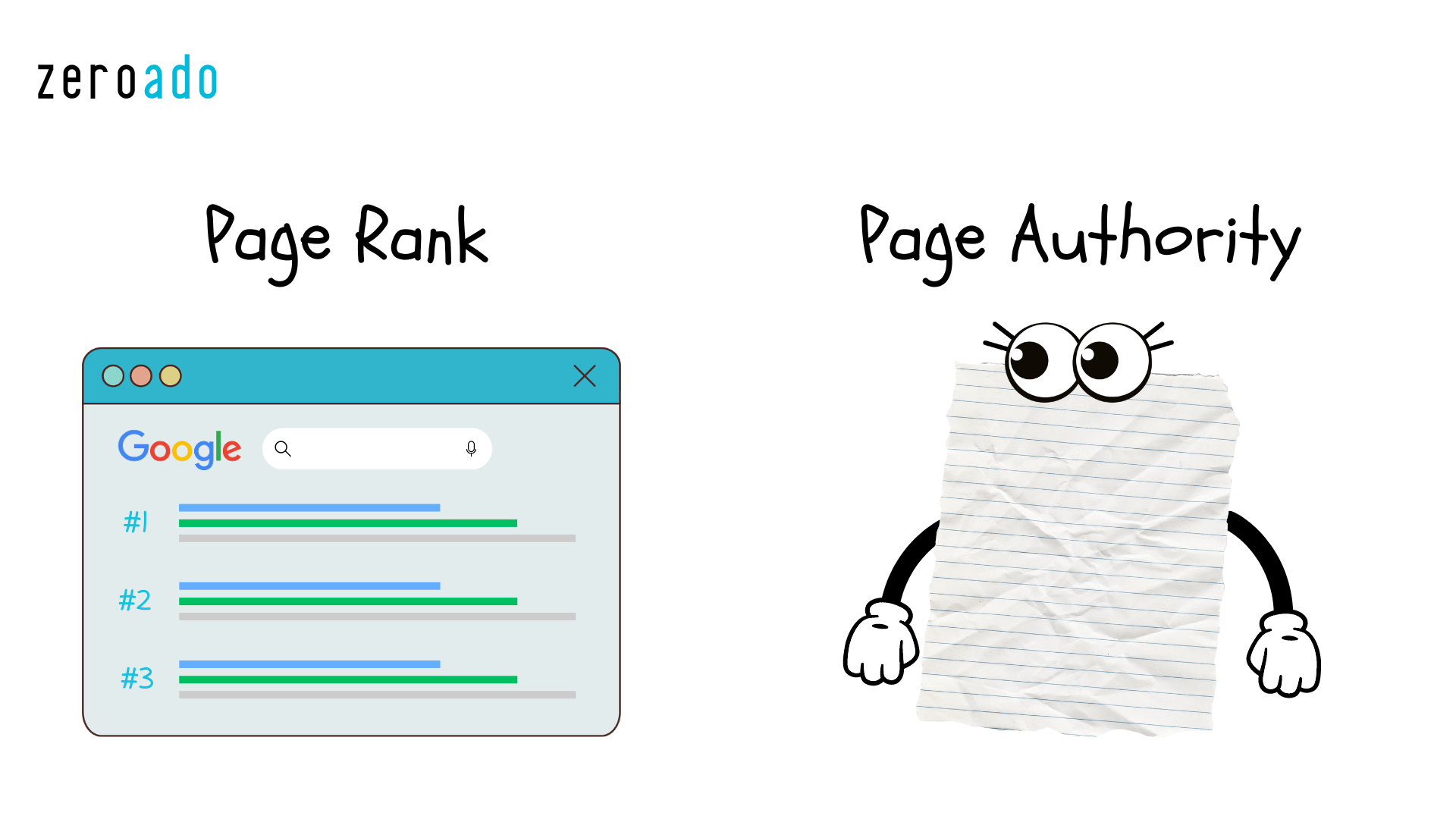
Page Rank (PR) and Page Authority (PA) are two important concepts that help us understand how a webpage performs in search engine results, but they work in different ways.
Page Rank is like a score given to a webpage by Google. It measures how important a page is based on the number and quality of links from other websites. It’s similar to having a recommendation from someone well-respected in your field. If a reputable site links to your page, it boosts your Page Rank, making it more likely that your page will show up higher in search results.
On the other hand, Page Authority (PA) is a metric developed by Moz to predict how well a specific page will rank on search engines. PA is calculated based on factors like content quality, internal and external links, user experience, and overall SEO optimization.
How to check Page Authority?
To evaluate the Page Authority (PA) of a specific webpage, several online B2B SEO tools can help you gain valuable insights. Here’s a detailed look at some of the most popular options:
Moz Link Explorer
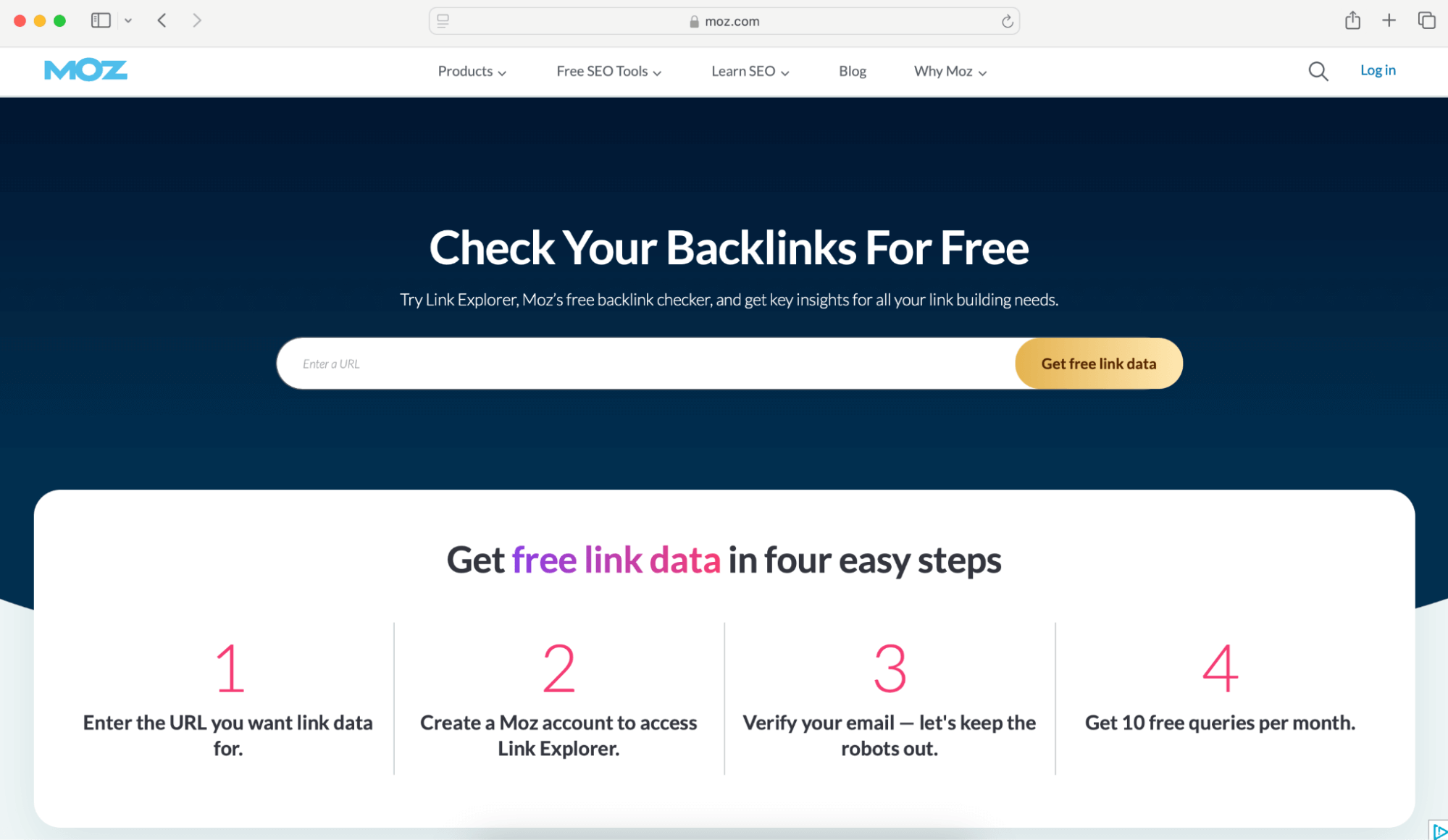
Moz Link Explorer is a popular tool developed by Moz that allows you to analyze backlinks and evaluate the authority of web pages. It’s especially useful for understanding how well a page might rank in search engines based on its link profile.
Key features of MOZ Link Explorer
- It provides a score from 1 to 100 that predicts how well a page will rank. The higher the score, the more likely the page is to perform well in search results.
- MOZ helps you measure the overall strength of a domain based on multiple factors, including the quantity and quality of backlinks.
- It also offers insights into the total number of backlinks, referring domains, and the quality of those links. So, you can see which websites link to your page and what are their respective authority scores.
How to use MOZ Link Explorer
- Visit the Moz Link Explorer website.
- Enter the URL of the webpage you want to analyze in the search bar.
- Click on “Search,” and the tool will display the PA and other relevant metrics.
- Explore the backlinks to see which sites are linking to you and their authority levels.
Ahrefs

Ahrefs is another powerful SaaS based SEO tool that provides a range of features, including website analysis, SEO audits, keyword research, and backlink analysis. It’s known for its vast database of backlinks, and keywords, making it a favorite SEO tool for SEO professionals, and companies.
Key features of Ahrefs
- Similar to Page Authority, it offers a URL rating (UR), which indicates the strength of a specific URL based on its backlink profile.
- With its Site Explorer feature, you can get an in-depth analysis of any URL, including organic traffic estimates, top keywords, and competitor data.
- Its Content Explorer allows you to search for top-performing content in your niche to help you easily identify potential topics and keywords.
How to use Ahrefs
- Go to the Ahrefs website and log in to your account.
- Use the Site Explorer tool by entering the URL you want to analyze.
- Review the metrics displayed, including the URL Rating, referring domains, and backlink profile.
- Utilize the additional features to explore keywords and content performance.
SEMrush

SEMrush is a comprehensive SEO suite that offers a variety of tools, including the ability to check Page Authority, track SEO performance, detect duplicate content, conduct competitive analysis, and optimize content.
Key features of SEMrush
- Similar to Page Authority, SEMrush provides an Authority Score that reflects the overall quality of a domain or URL.
- You can also analyze backlinks to see their quality, distribution, and the referring domains that contribute to your page’s authority.
- It helps you find relevant keywords with its keyword research tool.
- You can also monitor your ranking for specific keywords with its position tracking.
How to use SEMrush
- Visit the SEMrush website and create an account.
- Navigate to the Domain Overview tool and enter the URL you want to analyze.
- Review the results, which will include the Authority Score, backlink profile, and other important SEO metrics.
- Explore additional tools for keyword analysis and competitor insights.
Apart from the aforementioned tools, there are several other options which can help you check Page Authority.
- Ubersuggest
- Small SEO Tools
- Linkody
Now, let’s talk about the improvements for which you’ve clicked. 🙂
How to improve Page Authority score?
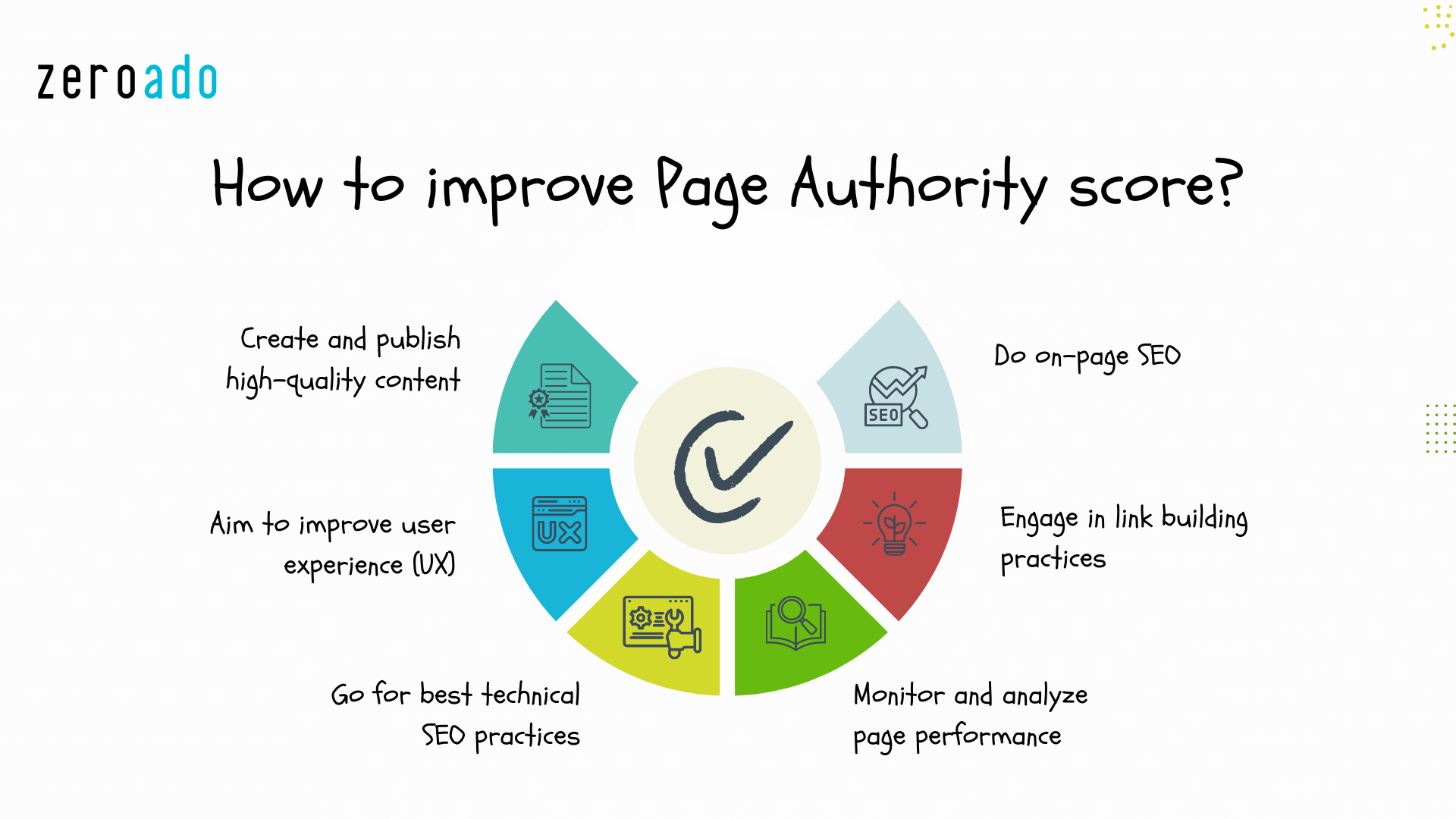
Increasing your Page Authority score doesn’t happen overnight, it requires time, effort, and a strategic approach to SEO. Let’s discuss them one by one.
Create and publish high-quality content
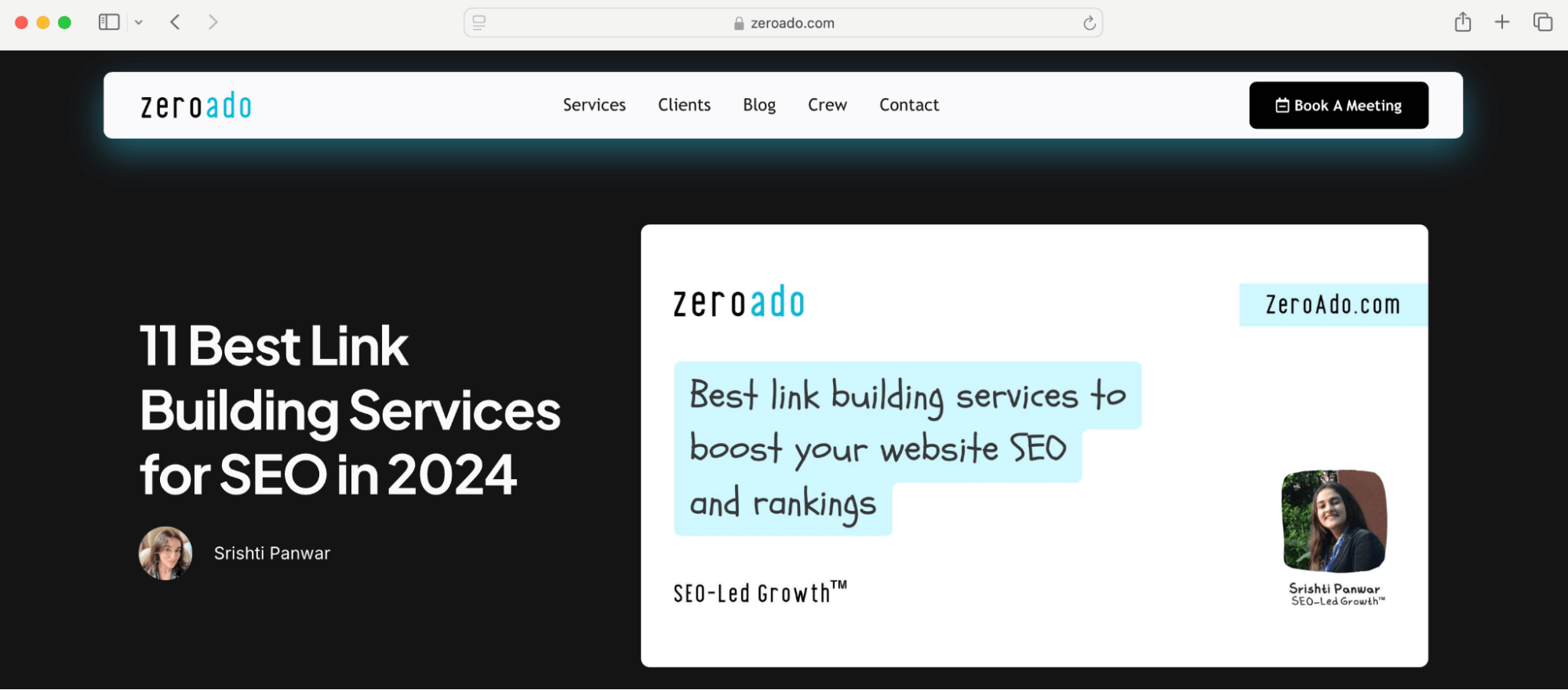
See the above image, it’s one of our blogs that are ranking on Google for the main keyword “best link building services”. This ranking didn’t happen by chance, it’s a result of consistent effort in creating valuable, keyword-optimized content.
When your content resonates with your audience, they’re more likely to engage, which in turn signals search engines that your page offers something valuable. This helps in boosting both your ranking and Page Authority.
Apart from this, regularly updating your existing content with fresh, relevant information is key to maintaining or improving your rankings. By keeping your content current, you ensure its relevance and authority in the eyes of both your audience and search engines. This helps in driving more organic traffic and generating leads over time.
Moreover, you can add unique value propositions, which we at ZeroAdo generally refer to as the X-factor. This includes insights, reviews from trusted sources, media such as images and videos, or perspectives that are not available on competitive pages, all of which can help make your page stand out.
Do on-page SEO
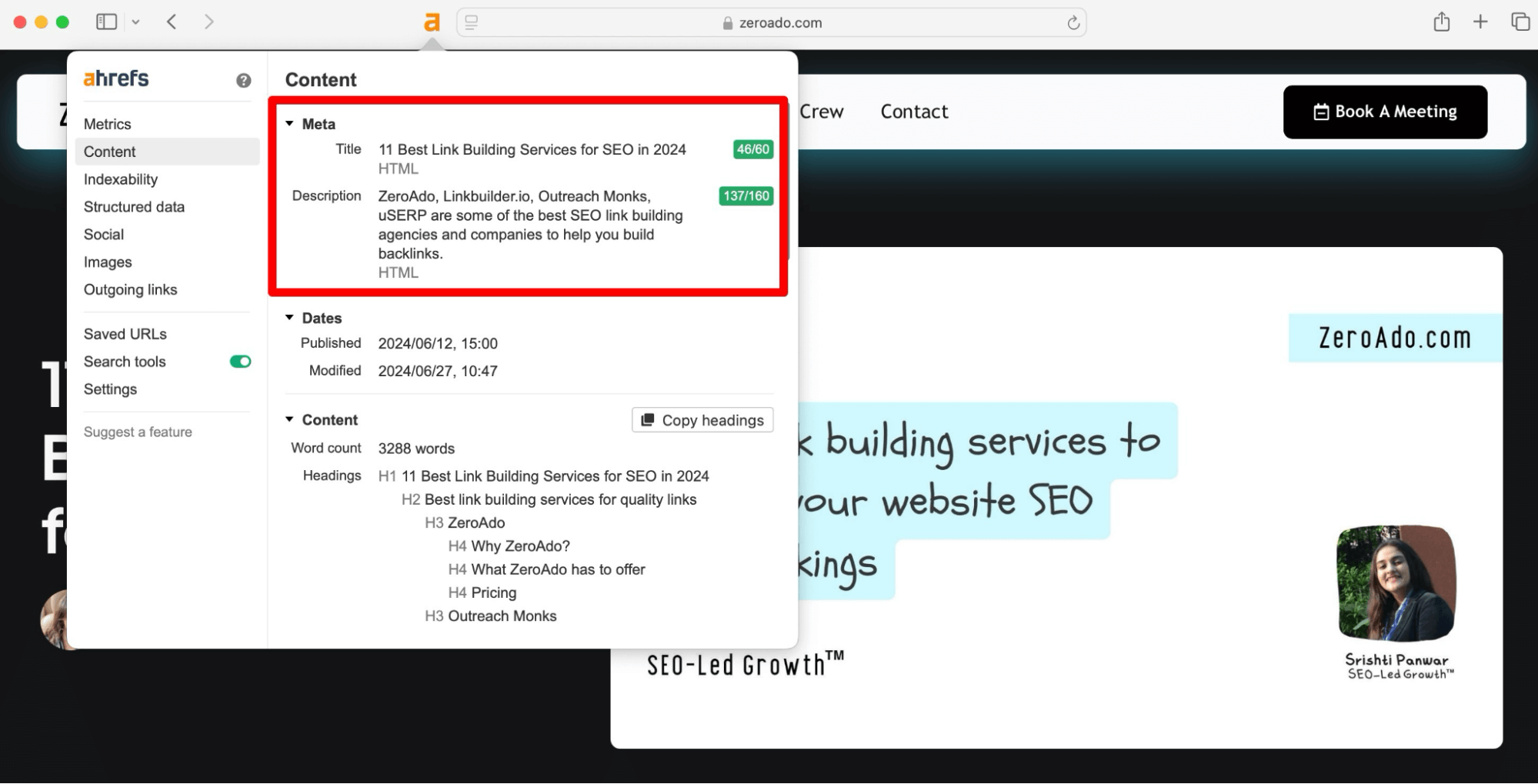
On-page SEO are the activities that are carried out directly on the website to improve its content and structure for search engines and users. This involves keyword research, writing catchy headlines, optimizing web content, title and meta description optimization, URL structure, and more.
To perform keyword research you can use tools like Ahrefs or SEMrush. This helps you identify keywords that are relevant to your content. After this, try to integrate these keywords naturally into your content, headings, and meta tags.
All these optimizations help search engines understand the content of your page and can increase your Page Authority and click-through rates.
Build backlinks from high DA sites
I know you’ve read this term multiple times, but building quality backlinks is crucial for improving your page’s authority and visibility. This can be done in several ways. One effective strategy is guest blogging which means by writing guest posts for reputable websites in your industry, you can earn valuable backlinks. This also establishes your authority and exposes your SEO content to a broader audience.
Another method is link exchange, which involves offering links from your site in exchange for links from other sites. Together, these strategies can significantly improve your website’s link profile and increase your Page Authority.
Aim to improve user experience (UX)
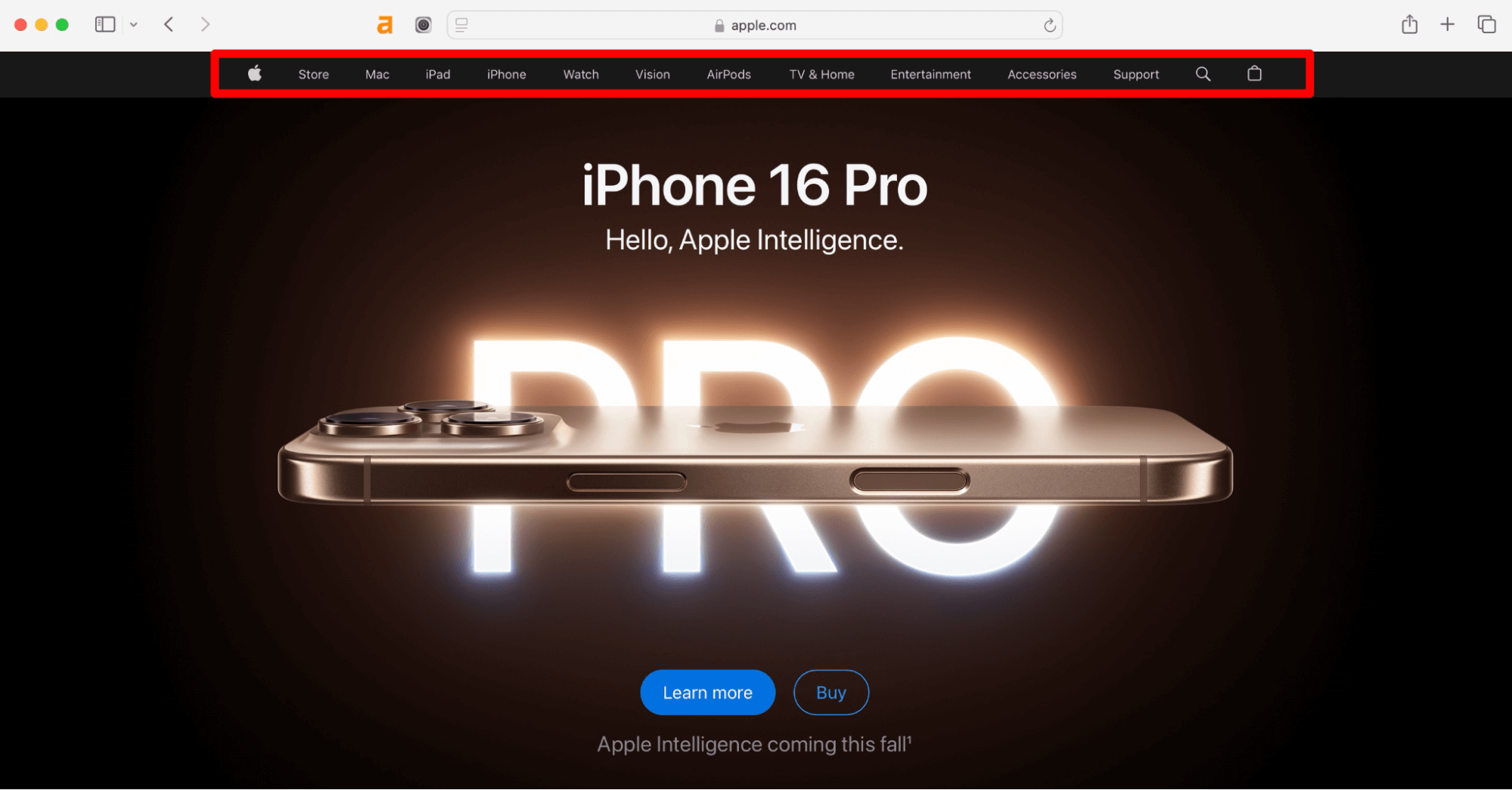
You might be wondering why there’s a screenshot of Apple’s website above. The reason is simple—Apple has implemented an impressive feature that allows users to seamlessly browse products, services, accessories, and support options just by scrolling through their menu bar. This user-friendly interface enhances navigation and encourages users to explore more of the site.
Just like Apple, your website should also prioritize user experience to keep visitors engaged.
Make sure your website is fully responsive and performs well on all devices. A mobile-friendly design is crucial for user experience and can positively impact your Page Authority. You can also optimize images, reduce server response time, and leverage browser caching to improve your page load speed. Use tools like Google PageSpeed Insights to analyze and improve your site’s performance.
Engage in link building practices
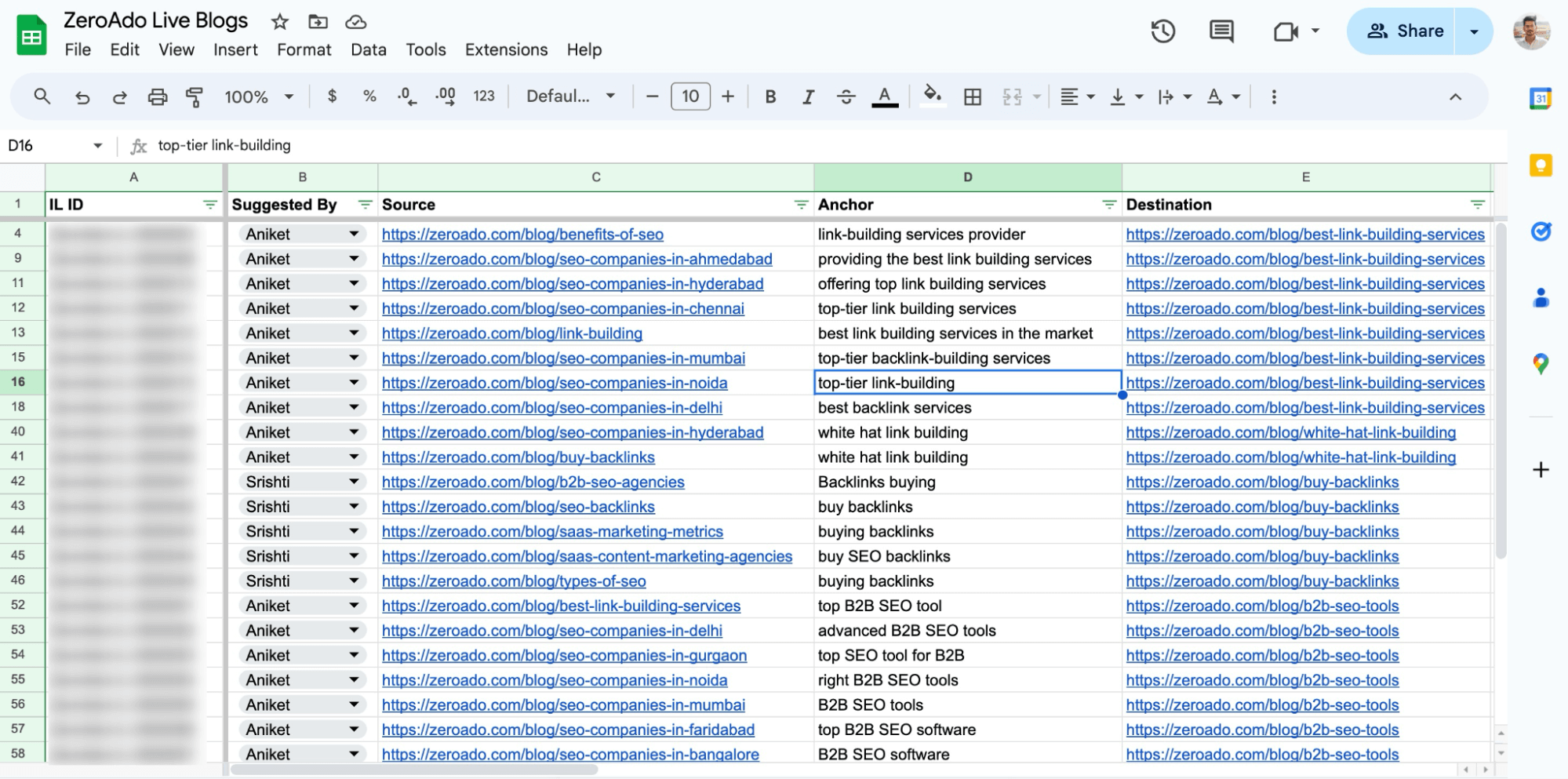
Engaging in effective link-building practices is crucial for improving your website’s overall authority and visibility in search engine results. One essential strategy is internal linking, by linking to other relevant pages on your site, you can help distribute link equity throughout your domain. This not only improves user engagement but also reinforces the authority of your individual pages.
Additionally, you can also incorporate external links to authoritative sources within your content. This practice adds value for your readers and positions your site as a credible resource, increasing the likelihood of your Page Authority.
Also, regularly auditing your backlink profile is another key aspect of maintaining your Page Authority. By identifying and disavowing low-quality, or spammy PBN backlinks, you can safeguard your site’s reputation and ensure that your link profile remains healthy.
Monitor and analyze page performance
Regularly checking your Page Authority using tools like Moz, Ahrefs, or SEMrush is essential to track your progress and understand which strategies are effective. Monitoring these metrics allows you to see how your efforts are influencing your site’s authority and overall performance.
Additionally, it’s important to review the Page Authority of the sites that you’re linking to. Analyzing their Domain Authority (Domain Rating in Ahrefs) and traffic can provide insights into the quality of those links. High-authority sites can positively impact your own Page Authority and help you build credibility.
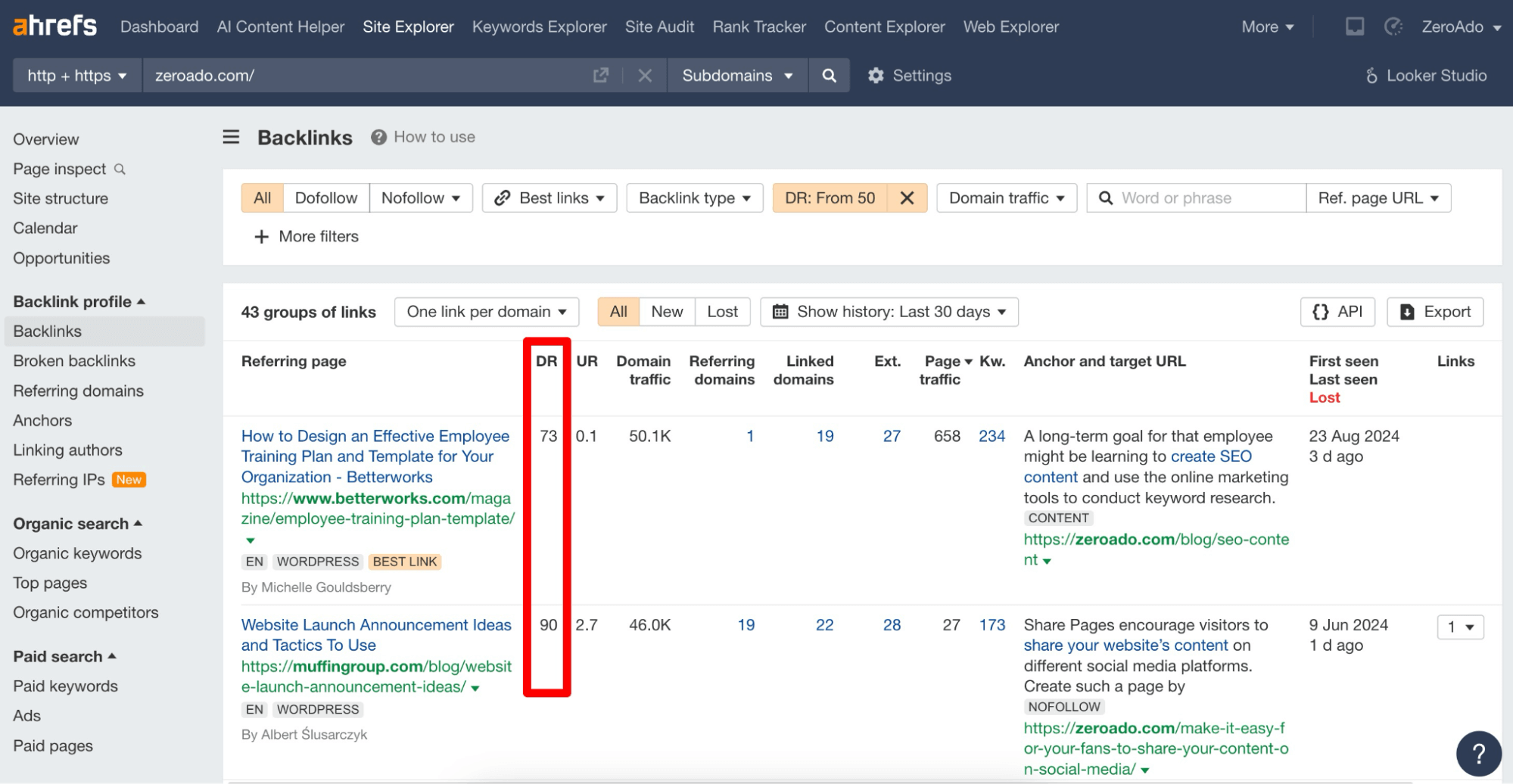
For example, in the image above, we’ve linked our blogs to high DA sites that are trusted and well-known. By connecting our content to these reliable sources, we increase our own Page Authority and improve our chances of ranking higher on search engines.
This approach not only makes us look more credible but also helps bring more visitors to our site, as people are more likely to trust and read content that references well-respected sites.
Engage with your audience
Last but not the least, another way to increase Page Authority is by engaging with your audience. If you’re responding to comments on your blog or social media, you’re building a loyal community. This kind of interaction keeps users coming back, and search engines pick up on that engagement, which can positively affect your Page Authority score.
Plus, using email marketing is a great way to bring users back to your site. Sending out newsletters with your content helps drive traffic, which boosts engagement and signals to search engines that your content is valuable. In short, optimizing your site for direct visitors not only increases your traffic but also enhances interaction, which usually leads to a higher Page Authority.
Improve your Domain Authority (DA)
To increase your Page Authority score, it’s important to focus on quality over quantity when building backlinks. Instead of just trying to collect as many links as possible, aim for high-quality backlinks from authoritative websites. These links have a much bigger impact on improving your site’s authority compared to a bunch of low-quality ones.
For this you can consider ZeroAdo backlink buy services where we collaborate with thousands of link builders and SEO experts from around the world to build quality backlinks.
Additionally, building a strong brand is key. If you’re consistent with your marketing efforts, public relations, and community engagement, it not only strengthens your brand but also makes it easier to attract those quality backlinks. A well-known brand tends to naturally get more attention from credible sources, which helps boost your Page Authority.
Invest in SEO if you want to increase your Page Authority
Improving your Page Authority is a gradual process that requires ongoing effort and attention. By focusing on high-quality content, effective SEO practices, building backlinks, and enhancing user experience, you can significantly improve your PA score over time.
However, to achieve this, you need to invest in SEO essential. Whether you build an in-house SEO team or outsource your SEO needs, it’s critical to have the right expertise to execute these strategies effectively. That’s where ZeroAdo comes in!
ZeroAdo is one of the best Indian SEO companies that offers comprehensive SEO services customized to your business needs. From on-page optimization to link building and performance tracking, ZeroAdo’s team of experts can help you improve your Page Authority, boost your rankings, and drive organic traffic to your website.
With ZeroAdo, you’re partnering with a team that understands the nuances of SEO and is dedicated to delivering measurable results.
So what are you waiting for? Reach out to us today!
Frequently Asked Questions – Page Authority
Page Authority (PA) in SEO is a metric created by Moz to predict how well a specific page on your website will rank in search engine results. It’s scored on a scale from 1 to 100, with a higher score indicating a better chance of ranking higher.
PageRank is an algorithm used by Google to measure the importance of web pages based on the content, and number of quality backlinks. Domain Authority (DA), on the other hand, is a Moz metric that predicts how well your entire website (domain) will rank in search results. PageRank is a Google system, while DA is a Moz-specific metric, but both help you understand the strength and rank potential of your website.
Page Authority (PA) measures the likelihood of a specific webpage on your site ranking well in search results. It takes into account factors like the number and quality of backlinks pointing to that page. The higher your PA score, the more likely that particular page is to rank well.
A good Page Authority depends on your niche and competition. Generally, a PA score between 40 and 60 is considered strong. If your page has a PA above 60, it’s in excellent shape. For newer websites, a score of 20-30 is a good start as you build your authority over time.
Page Authority is calculated using factors like the number and quality of backlinks, MozRank, and page content. It’s a logarithmic score, meaning it’s easier to increase your PA from 20 to 30 than from 70 to 80. Moz uses machine learning to update and refine the score regularly, so it changes as new data is gathered.
Page Authority is important because it gives you an indication of how well your individual pages will rank in search results. The higher your PA, the better your chances of ranking high on Google, which can lead to more organic traffic and visibility for your site.
While Page Authority itself isn’t a ranking factor used by Google, it’s a helpful tool for you to assess how well a page might perform. Google uses its own algorithms, but PA correlates with important ranking factors like link quality, making it a useful guide for improving your SEO strategy.
Google Page Authority is not an official Google metric. It’s a Moz tool that helps you predict how well your page might rank on Google’s search results. While Google doesn’t use PA directly, it reflects important SEO factors like helpful content, and backlinks, which Google does consider in its rankings.
